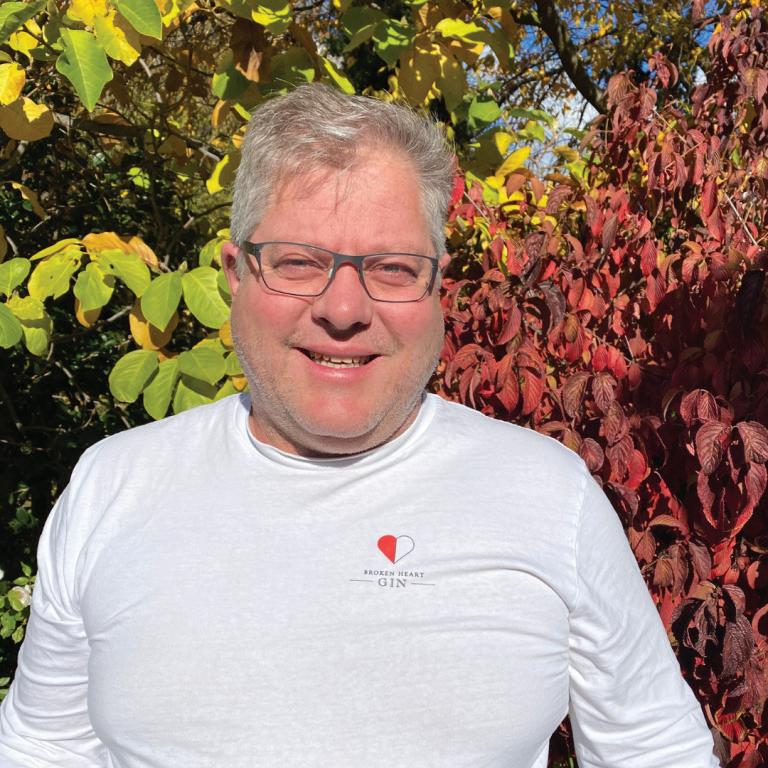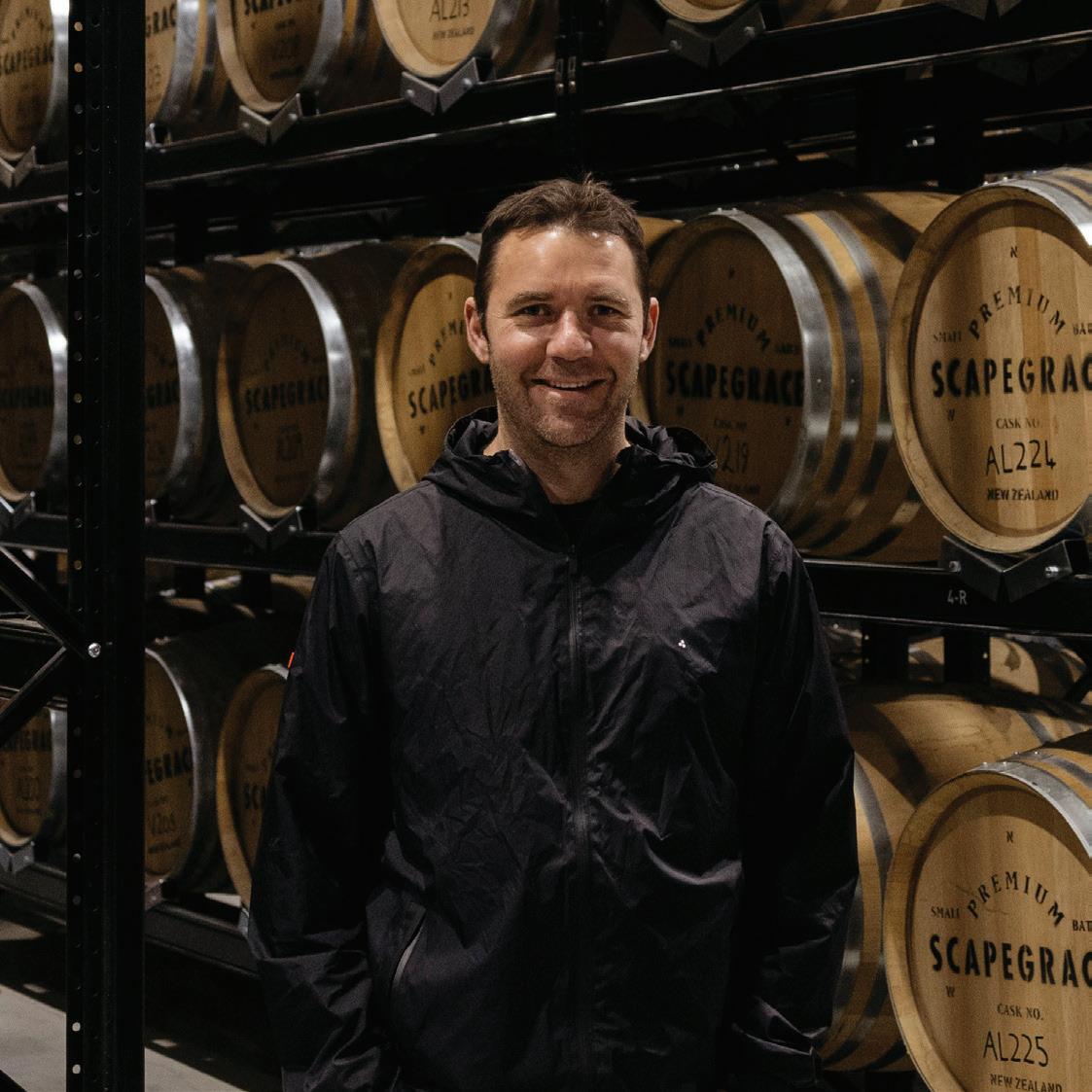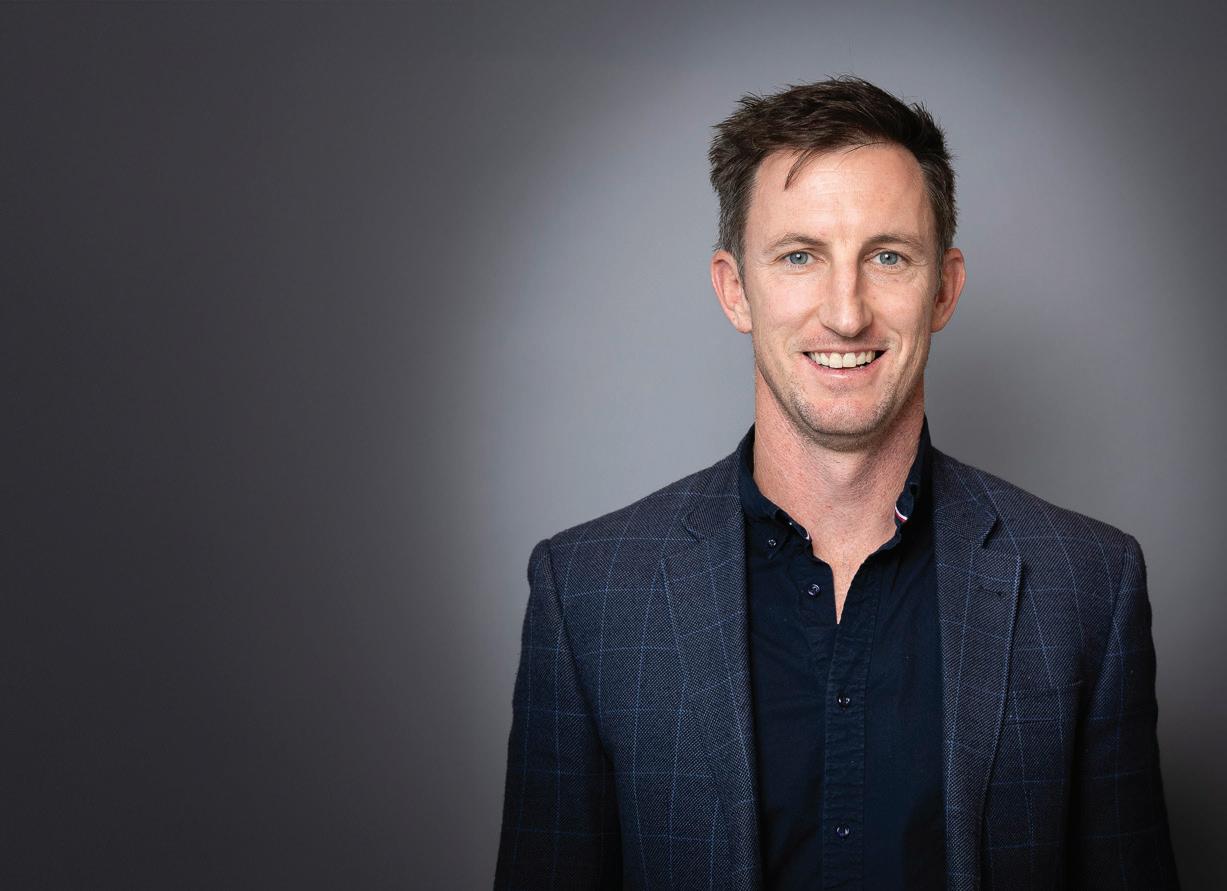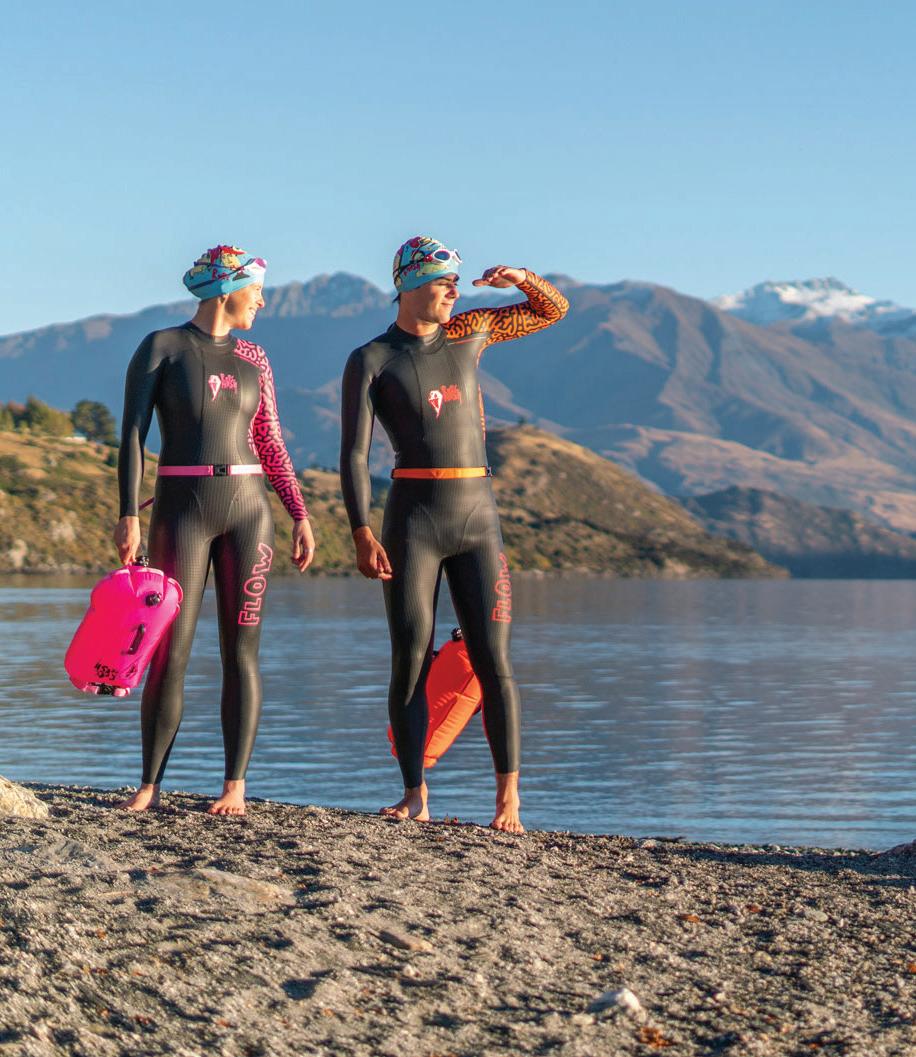LAKES BUSINESS
SOUTHERN LAKES BUSINESS QUARTERLY









Gents is a cut above
by Jess AllenHenry Brain is at the helm of Shotover Street’s Gents Barbershop. e traditional and stylish barber also o ers a whisky bar and lounge in addition to the array of services you’d expect. Brain’s been on this business journey for three years and has grown the shop to where it is now – over 350 clients a week walk through the doors – and he has desires to open more stores in the region in the next few years.
Brain has been in the industry for about 14 years now and has been working outside of the UK, where he’s originally from, for 10 of those. He came to Queenstown about six-and-a-half years ago and as he arrived, Gents was just opening up as an e-commerce business. He started as one of the rst barbers in the shop and stepped into a management role.
“It was only one sta member at the time, just the director,” Brain says. “As the years have gone by the company has sort of grown and grown. About three years into operating the barber shop I was in a position where I could buy it from the owner as he was looking to venture out and do other things. I had the right skillset to acquire the business and I bought it two-and-a-half or three years ago now.” e shop has continued to grow; it now boasts a team of seven, and while their clientele is predominately locals, they do have many people passing through stopping by for a service as well. e dynamic of a barbershop is an important one, and something that di ers from a hairdresser.
“We’re trying to create an experience rather than a haircut. For the male grooming industry, what we try and do is actually make it more of a pleasure rather than a chore, and to try and culturally change that – in Europe and the UK it’s seen as rostered treat. It may be every second ursday and they come in and they have a beer, they chat with their barber and they create long-standing relationships with their barber, and enjoy coming to the shop. Here in New Zealand, especially down in the South Island, it’s a bit of a chore.”
Brain and the team are working to change that mentality. ey want the experience to be a treat for their customers, giving them the ability to come and sit at the bar, relax, and most importantly, leave with a premium haircut or shave. He wants to be a venue where they can host all of men’s grooming needs without them feeling uncomfortable or that they have to walk into a female-dominated business such as a salon. ey try and carry on traditional barbering with a contemporary spin.
Brain has hopes of opening more shops within the region and scale up the business. He speaks of his journey to this point and that there was a lot of learning along the way. He says, in short, “it really is just fake it until you make it.” e network of people that he’s built up has helped, too. One of the bene ts of seeing hundreds of clients a week is that you get to meet people from a diverse range of backgrounds.
“I’m not scared to be inquisitive or ask people any questions. A er working here for so many years, you create a great relationship with people that have a lot of trust in you with certain topics – if you ask them about their business. You learn a lot from that. e business side of things, I think a lot of that comes down to time management. It was a tough learning curve for the rst six months to understand how to do the marketing side or the accounting, admin – all of that stu as well as still working ve days a week. A er a year, I’ve got on top of that, delegated and learnt where I’m best positioned and where’s best my role,” Brain says.
e most important thing in Brain’s business has always stayed the same – trying to change the way that men look at grooming and to provide the best possible service with a unique experience. You can read more about Gents and book in for a service at gents.co.nz


Friendship a recipe for success
irteen years or so ago, James Ace and Bert Haines knew each other socially when a chance meeting in the street changed everything.
“We got chatting, and James o ered me the job of Operations Manager which I jumped at,” says Bert. Every now and again the pair – now co-owners -- look over their shoulders and re ect on the serendipity of that moment.
irteen years of innovation and growth at what has become Future Hospitality Group is based on “an incredible friendship” and a working relationship recognising their individual skillsets and di erent personalities with e ective communication at its heart.
Ask Bert to describe James and he’s to-the-point. “He’s an innovator, a disruptor, very creative and has a meticulous eye for detail.”
James on Bert? “He’s ercely competitive in striving for a very high performing leadership team and business. He leads by example in working very hard to deliver results, passionate about people and our ethos of everyone working with us leaving in a better position than when they started.
“I’m the one who’ll jump in feet rst, I’m pretty good at cutting before measuring. Bert probably measures a few times, but we nd a healthy balance.”
And if things aren’t going well, they’ve learned how (and when) to talk to each other.
“We call it pacing, having learned through external reviews and our professional development to recognise our di erent strengths and ideas and know the time and place to raise issues or discuss something heavier,” says Bert.
Sponsored
“We ‘pulse check’ that the other person is in a good spot to handle whatever we need to and negotiate around disagreements. We’re thick as thieves but still had to gure out that process.”
ey have a laugh together “on the daily,” play golf and even go away on holidays together (in the name of market research!)
“We challenge each other, we’re yin and yang, but we’re always super respectful and trust is a big thing,” says James. “I can be really passionate about something but have learned to ask myself ‘what would Bert think’.”
e pandemic could have put a serious dent in their growth trajectory but these self-described big dreamers and risk takers instead saw opportunities.
ey opened Mexican-inspired restaurant Margo’s in 2020, while lockdowns and border restrictions still existed, on just 15% of the original budget.
It was followed by Queenstown Ice Bar (Feb 2022), tequila and mezcal-inspired bar Little Mez (July 2022), and neighbourhood eatery odd saint (Dec 2022), adding to existing outlets Little Blackwood and Minus 5º ICE BAR.
In July 2023 they jumped at the opportunity to buy El Camino Cantina in Upper Village, re-opening as Miss Rita’s Cantina in December.
“Buying it was a no brainer, a plug and play if you will,” says James. “It was a very quick mutual decision, we know and love Mexican cuisine and could see a nice point of di erence with an authentic Tex Mex concept sitting alongside what was already happening in town. e tout’s one of the most electric in town and Upper Village has a great mix of hospitality and entertainment.”
When it comes to seeking new business opportunities, they’re both well connected community-wise, have ears to the ground, and a strategic development plan.
But they admit they’ve made costly mistakes and bad decisions in the past, delivering the best education and biggest learnings.
“We’d look at every opportunity and try to ‘square peg round hole’ it,” says James. “Now we now have concepts ready to go and are very selective with acquisitions and green eld sites a er taking years to gure this out.”
Opening Margo’s enabled Bert and James to bring experienced chef Matt Tobin into their fold. He’s now group Executive Chef and co-owner of odd saint and Margo’s alongside Bert and James.
“Our people are our most valuable asset, without them we wouldn’t have a business,” says Bert. “We proactively look for A-players and those with the potential to be such.
“Turning employees into potential business partners is our dream, and we were delighted to realise that with Matt, a true foodie.”
“Neither of us are chefs, so Matt’s like the third leg of the stool, an integral part of our business now and in the future,” says James. “We couldn’t deliver what we are without him. He IS hospitality.”
From 15 employees mid-pandemic they’re now around 100 full-time equivalent sta , working closely with site managers to instil company culture at all levels.
“We’re all about being transparent and honest, collaborating with them at every step,” says Bert.
Sponsored
Casual luxury comes to town
Luxury accessories brand Deadly Ponies is moving south.
e Auckland-based design house opens its rst South Island store in Queenstown next month, on the corner of Rees and Beach Streets, in the heart of downtown’s new pedestrianised area..
Established in 2005, Deadly Ponies produces handcra ed bags, shoes, jackets, wallets and other pieces from supple, ethically-sourced leathers and materials, with a signature New Zealand style which has attracted a global customer base.
Liam Bowden and husband Steven Boyd are behind the brand, building it up from a garageproject to an internationally recognised label, with agship retail stores in Auckland and Wellington. Boyd says Queenstown has been in their plans for about three years.
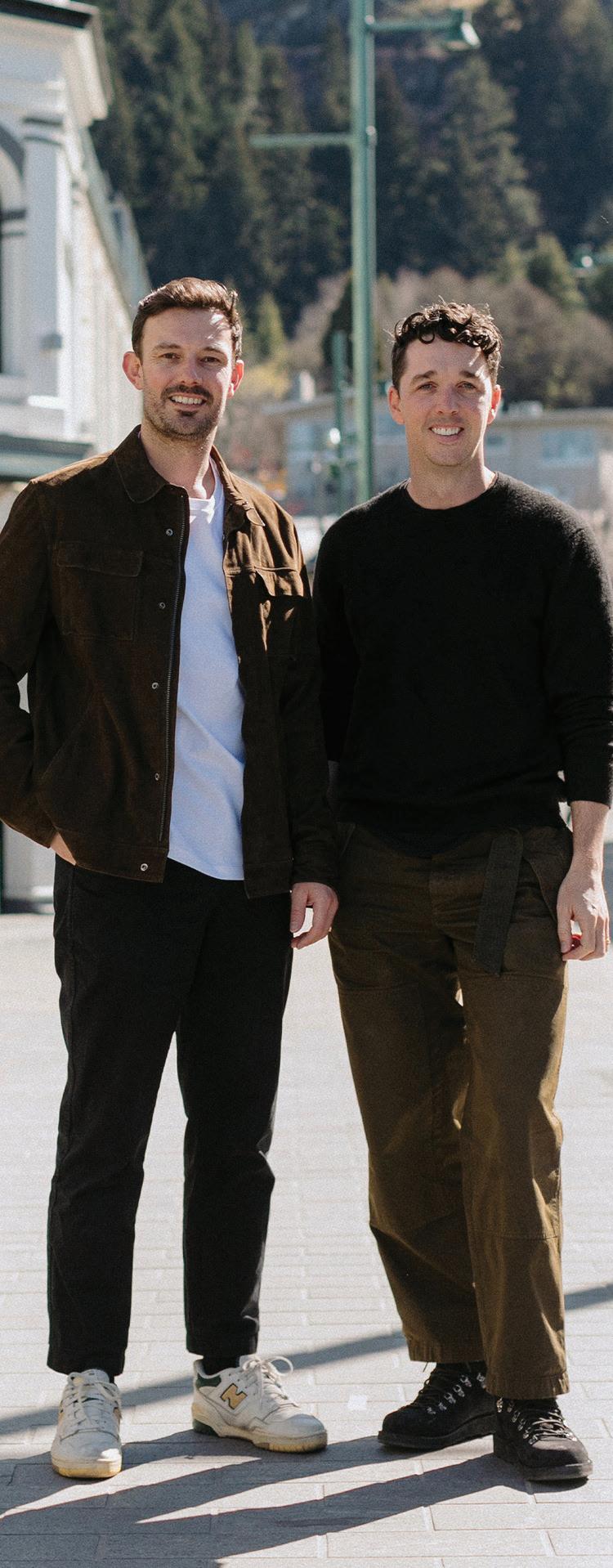
“It’s that opportunity to present the brand to a wider audience, with such a cycle of new customers coming through, all the international tourists, especially the Australians,” he says.
“We’ve had a really strong Australian business for a decade, and this o ers a chance to engage with them.
“We also have a really good local customer base in the South Island too, so it’s a nice combination and a great location for a store.”
e 50sqm premises, the former Partridge Jewellers site, is in one of Queenstown’s premium locations, with downtown now attracting more and more luxury brands.
“Retail is the part of the business I really enjoy,” says Boyd, who is the company’s managing director.
“It’s pretty dynamic, right, and one of the challenges for us as we were growing was nding ways to present the brand.
“Even though we’ve got an amazing stockists network, loyal stockists we’ve had for 15 years, there’s nothing quite like having your own place. at’s why we focus really heavily on our interiors, making the spaces feel sort of like small homes, loungy. Very quiet, quite intimate spaces, so ly lit.
“Our customer service strategy is warm and inviting. We steer away from that heavy luxury and lean into the fact that New Zealanders are far more casual shoppers. We want an environment that re ects that.”
e store will carry around 50 products, not the whole range, but there will be some bespoke creations to celebrate the opening in Queenstown. e pieces are casual luxury, day wear rather than events.
“Trends shi in and out but currently, post Covid, a lot of brands are now leaning into that aesthetic.”
ey are designed in their Auckland studio and manufactured by select global partners who share the brand’s sustainability values, each signing the Deadly Ponies code of conduct.
e journey began with creative director Liam Bowden making one-o leather pieces and jewellery in his garage, taking scraps from tannery o -cuts to create his rst designs.
He’s self-taught in pattern construction, sewing, and nishing, and when he was studying graphic design at university, Liam made a pair of goat fur slippers jokingly passing them o as pony fur. ey were nicknamed his ‘Deadly Pony’ slippers.
“He began creating stickers with this nickname, and as he ventured into selling products at markets, he casually jotted down prices on the back of these branded stickers. Without realising it, he inadvertently gave birth to Deadly Ponies.” Boyd says.
at upcycle ethos is retained within the business and one of its core philosophies is to have as minimal impact on the environment as possible.
e high-quality leathers are tanned without harmful chemicals and the products use 100% recyclable solid brass, which means the leather can be refurbished and brass melted down to form new products. ey invite



customers to earn a $50 gi voucher by returning pre-loved Deadly Ponies products. e company has also moved to zero plastic and aims to be zerowaste certi ed by the end of FY24.
“You really have to commit to it but being small gives you a lot more exibility to move faster, by not carrying a huge amount of stock. We can run a very low production model. Most of our products sell out season on season. And that’s a deliberate strategy because it means we can innovate quite quickly.”
Queenstown will be something of a homecoming for Boyd, whose grandfather Douglas Badcock was born in the town and was a well-known landscape painter. “You could say it’s come full circle. He had a shop in town in the ‘60s or ‘70s, and back then handcoloured photos for tourism board displays around Queenstown. We’ll actually have one of his original watercolours on display.”

Producing the best
by Sue FeaTucked discreetly in rural tranquility o Speargrass Flat Road, one of New Zealand’s most successful lm production and risk management companies is quietly doing its stu , interacting with global lm heavyweights on a daily basis.
GFS was co-founded in 2004 by three-time Emmy Award-winning producer Julian Grimmond and his wife Frith O’Hagan, and over the years has won a host of industry honours. But for this humble Dunedin boy, who started out as a freelance researcher 30 years ago, that’s not what it’s all about.
ere’s plenty of hard grind, 16-hour days with 3am calls around the globe at times, but for Grimmond it’s a passion and it’s all been worthwhile.
GFS has worked on feature lms, television series and documentaries all over the world.
Con dentiality is paramount in the lm industry and while Grimmond strictly keeps his clients under wraps, the long list of credits on GFS’s website highlights plenty of big names in lm and fame. From History Channel, National Geographic, Fox and CNN through to Net ix and Sony, most recently these include Prince Harry and Oprah Winfrey’s Apple TV mini-series and Academy-award-nominated ‘Don’t Look Up’.
Starting as a director for TVNZ and Natural History New Zealand in Dunedin, Grimmond developed and helped sell an idea to Discovery Channel for a realty ski season series – ‘Adventure Central’, shot in Queenstown in 1999 which he directed.
A producer on e Amazing Race, working all over the world, he won three Emmys and a Producers Guild of America nomination as part of that team. His export focused production company was established to sell content overseas for various shows and series. “Our clients are the streamers, studios and networks across the US and Europe.”
In 2022 Grimmond launched screen production company, Emissary Pictures, with a number of lms and productions underway, including ‘ e Rider”, written by Kiwi actor Jospeh Taylor, who appears in Dev Patel’s latest movie Monkey Man.
“It’s a beautiful lm about Indonesia’s rst female motorbike stuntwoman who rides the Wall of Death – a huge passion project for us.”
“You grow your reputation through hard work and making tough decisions.”
Key to GFS’s success has been its ability to identify a gap in the market and deliver with “unquestionable quality”, leaning into new technology like AI. at gap was managing risk on lming locations around the world. “Good producers admit they may not know everything, so they seek expertise from people with that speci c knowledge.” at’s where GFS steps in as consultants for major industry clients around the world. “We’ve produced and consulted on productions in pretty much every country on earth.” at’s required considerable cultural empathy. “We love the di erences in the way people do business and the way cultures exist. You’re always trying to nd common ground. You become a cultural shock absorber between your clients and the communities where they want to lm.” It’s exhilarating and a great opportunity to work in far ung places like Jordan and Indonesia, he says.
“A large amount of what we do we’ve pioneered. We de nitely occupy a leadership function in risk management and screen productions,” Grimmond says.
He’s learnt a lot since he and Frith, the company’s COO, rst launched GFS from Queenstown almost 20 years ago, originally as Global Film Solutions. e company has become expert at assessing risk in a
game where reputation is paramount, Covid obviously creating phenomenal demand worldwide.
Despite its location this gutsy Kiwi company was rst out of the gates supporting lm productions around the world as the pandemic was starting to emerge overseas. “ at was an incredibly busy time for us. We’d spotted early signs overseas and advised our industry clients that it was coming.” Instead of hindering their business it became an opportunity to expand. “ e clients came to us. We recruited hundreds of skilled people all over the world to work alongside us,” he says.
At the end of the day though it’s about budget and time – time on task. “It’s just about absorbing every challenge.”
“Anyone can pursue their own creative business. You just need passion, drive, and determination to get there, humility, and an openness to work in collaboration with others,” he says.
“ ere’s a plethora of di erent characters in this industry. Just nd your tribe, keep to the content that’s yours and don’t judge other people.”
“We’re o en constrained in business by expectations – geographical and resources, but if you know what these are you can overcome them. We o er services to global companies by not being constrained working from here.”
While Queenstown’s viewed as anchored in tourism and construction and that’s vital, there are some highly successful creative businesses here, he says.
“We’re a diverse economy.”

